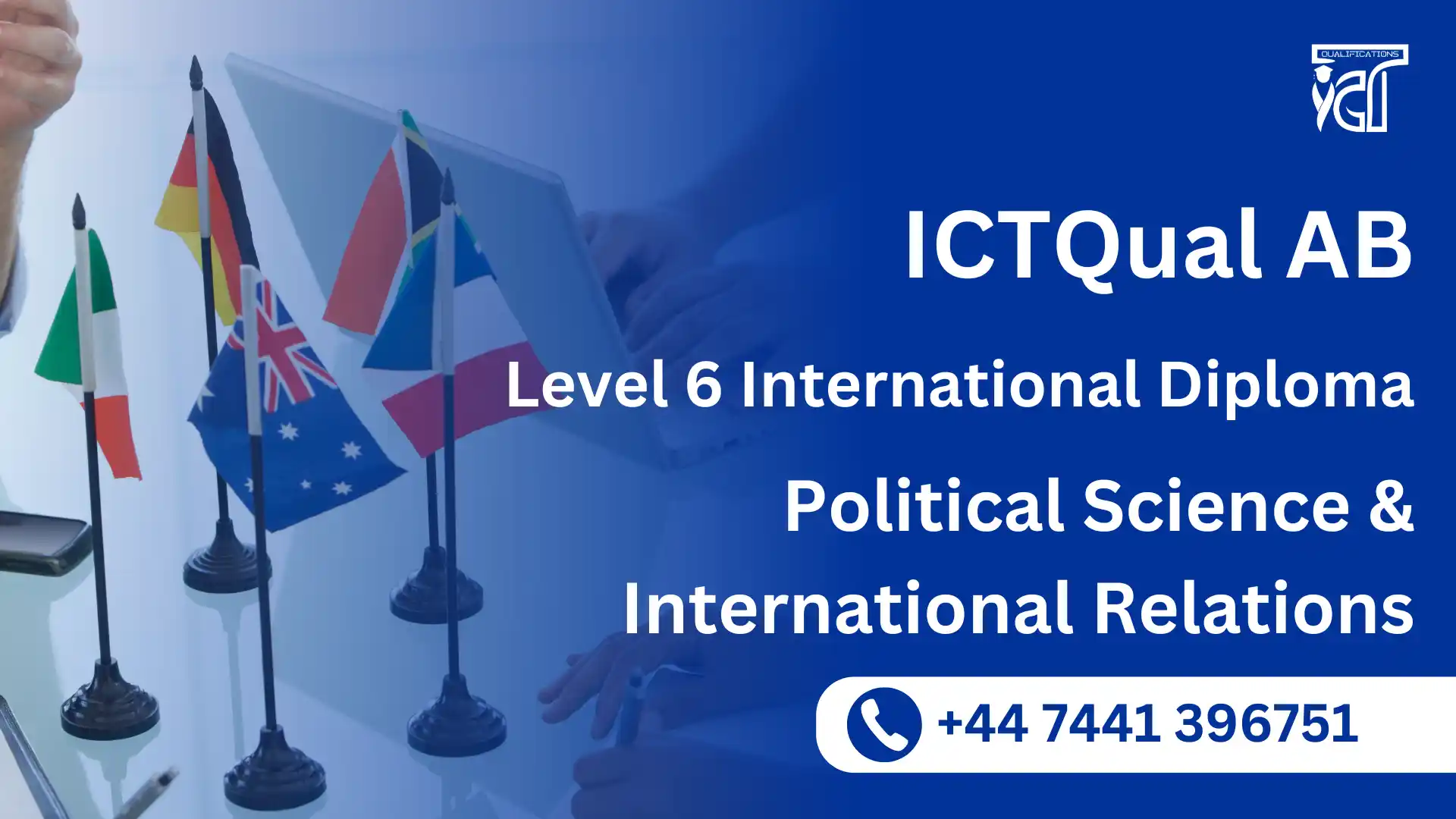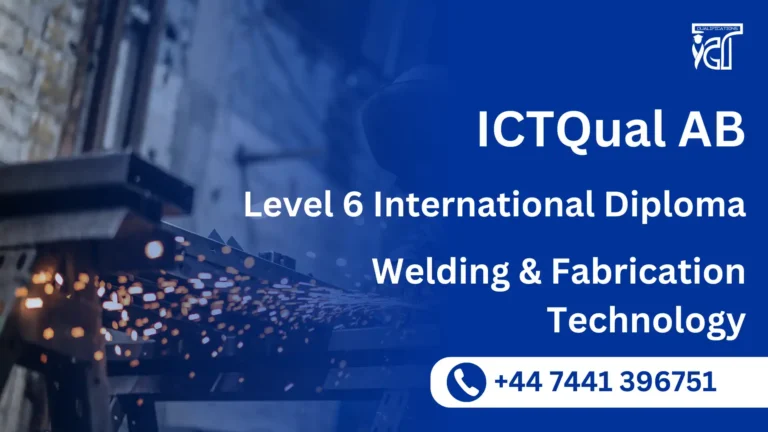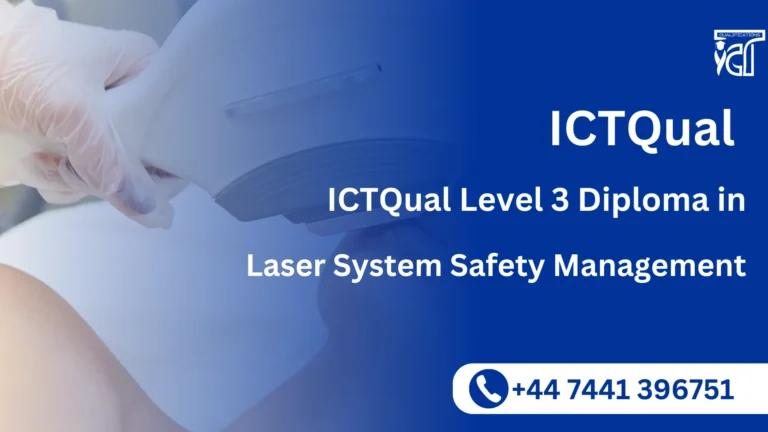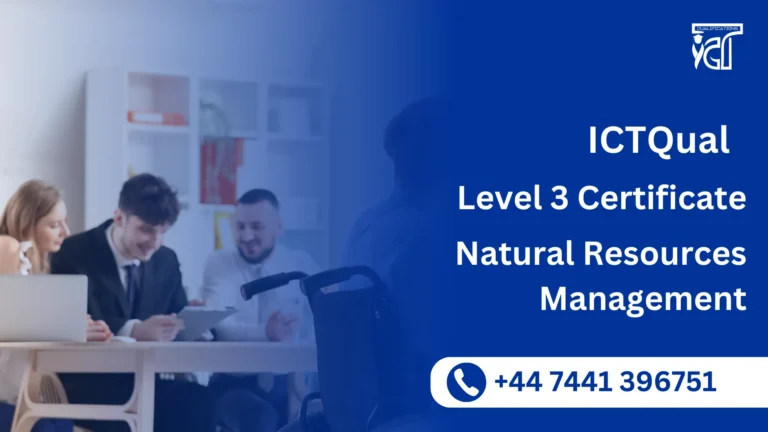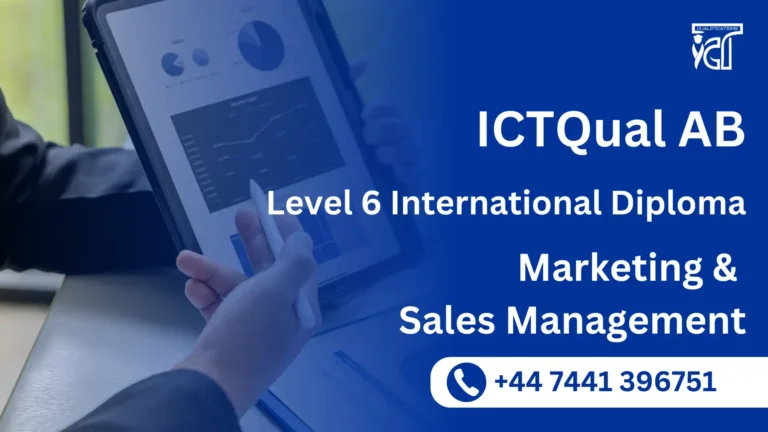The ICTQual AB Level 6 International Diploma in Political Science & International Relations is designed to equip learners with a comprehensive understanding of global politics, governance systems, and international affairs. Spanning a three-year programme with a 360-credit structure, this diploma provides a rigorous foundation for both freshers and experienced professionals aiming to enhance their knowledge and career prospects in political science, diplomacy, and international relations.
Learners will gain critical analytical skills, research capabilities, and practical insights into policy-making, international diplomacy, and strategic governance. The programme emphasises the development of leadership, negotiation, and cross-cultural communication skills, ensuring learners are well-prepared to navigate complex political and organisational environments. By integrating contemporary theories with real-world applications, the course offers a unique opportunity to bridge academic knowledge with professional practice.
Upon completion, learners can explore diverse career pathways, including roles in government institutions, international organisations, think tanks, policy advisory positions, and non-governmental organisations. The diploma also enhances opportunities for those pursuing academic research or higher education in political science, public policy, or international relations.
Key benefits of the programme include a structured learning journey that fosters intellectual growth, a globally relevant curriculum that addresses current political and international issues, and the development of transferable skills valued across industries. Learners also benefit from flexible learning approaches that accommodate professional commitments while maintaining a high standard of academic excellence.
This course is ideal for learners seeking to advance their careers, strengthen their expertise in political analysis, and engage meaningfully with the international political landscape. With its robust framework, the programme ensures learners graduate with the competence, confidence, and credibility required to succeed in today’s competitive global arena.
ICTQual AB Level 6 International Diploma in Political Science & International Relations
This qualification, the ICTQual AB Level 6 International Diploma in Political Science & International Relations, consists of 36 mandatory units.
Year 1 – Foundation in Political Science & International Relations
- Introduction to Political Science
- Foundations of International Relations
- Comparative Politics and Government Systems
- Political Ideologies and Theories
- History of Political Thought
- Principles of Public Administration
- Introduction to International Organisations
- Global History and World Politics
- Political Communication and Media Studies
- Research Methods in Political Science
- Human Rights and Social Justice
- Introduction to Diplomacy and Foreign Policy
Year 2 – Intermediate Political Science & International Relations
- Advanced Political Theory and Analysis
- International Law and Global Governance
- Political Economy and Development Studies
- Regional Studies: Europe, Asia, Africa, and the Middle East
- Conflict Resolution and Peace Studies
- Political Sociology and Social Movements
- Policy-Making and Public Policy Analysis
- International Political Economy
- Comparative Foreign Policy
- Security Studies and Global Challenges
- Research Methods and Data Analysis in Politics
- Ethics and Professional Practice in Political Science
Year 3 – Advanced Political Science & International Relations
- Contemporary Issues in International Relations
- Strategic Studies and National Security
- International Diplomacy and Negotiation
- Policy Analysis and Political Reform
- Globalisation and Transnational Politics
- Leadership and Governance in Political Institutions
- International Conflict and Crisis Management
- Political Risk Analysis and Strategic Decision-Making
- Environmental Politics and Global Sustainability
- International Cooperation and Development Projects
- Innovation and Emerging Trends in Global Politics
- Capstone Project in Political Science & International Relations
Learning Outcomes for the ICTQual AB Level 6 International Diploma in Political Science & International Relations:
Year 1 – Foundation in Political Science & International Relations
Introduction to Political Science
- Understand the scope, nature, and functions of political science.
- Explain the role of politics in governance and society.
- Identify major branches and approaches in political science.
- Apply basic political concepts to real-world contexts.
Foundations of International Relations
- Recognise the origins and key theories of international relations.
- Explain how states interact within the global system.
- Analyse the role of power and cooperation in international politics.
- Apply theories to assess global political events.
Comparative Politics and Government Systems
- Compare political systems and structures across nations.
- Evaluate the role of constitutions, legislatures, and executives.
- Examine different forms of democracy and authoritarianism.
- Interpret global case studies of governance models.
Political Ideologies and Theories
- Define core political ideologies and their historical roots.
- Distinguish between liberalism, conservatism, socialism, and others.
- Analyse the impact of ideologies on policy and society.
- Critically evaluate ideological influence in global politics.
History of Political Thought
- Identify classical thinkers and their contributions to political ideas.
- Explain the evolution of Western and non-Western political thought.
- Assess how historical ideas influence modern governance.
- Apply political philosophy to current debates.
Principles of Public Administration
- Understand the scope and purpose of public administration.
- Identify key functions of government institutions.
- Examine accountability, transparency, and efficiency in administration.
- Apply principles of management to public service delivery.
Introduction to International Organisations
- Describe the history and structure of international organisations.
- Explain the functions of the UN, WTO, IMF, and regional bodies.
- Analyse the impact of multilateral cooperation.
- Evaluate the role of international organisations in conflict and peace.
Global History and World Politics
- Trace the historical foundations of modern world politics.
- Explain the impact of colonialism, wars, and revolutions.
- Assess the role of historical events in shaping global order.
- Apply historical analysis to contemporary issues.
Political Communication and Media Studies
- Understand the role of media in shaping political opinion.
- Analyse political campaigns, propaganda, and digital media.
- Evaluate ethical challenges in political communication.
- Apply communication strategies in a political context.
Research Methods in Political Science
- Identify qualitative and quantitative research approaches.
- Develop skills in data collection and analysis.
- Formulate research questions and hypotheses.
- Apply research methods to political studies.
Human Rights and Social Justice
- Understand the principles of universal human rights.
- Analyse global human rights instruments and policies.
- Evaluate social justice challenges across societies.
- Apply human rights frameworks to case studies.
Introduction to Diplomacy and Foreign Policy
- Understand the role and principles of diplomacy.
- Explain the processes of foreign policy formulation.
- Analyse diplomatic tools, strategies, and negotiations.
- Apply concepts to real-world diplomatic case studies.
Year 2 – Intermediate Political Science & International Relations
Advanced Political Theory and Analysis
- Evaluate modern and post-modern approaches to politics.
- Analyse theories of justice, equality, and liberty.
- Compare classical and contemporary political thought.
- Apply advanced theories to political decision-making.
International Law and Global Governance
- Explain the nature and sources of international law.
- Analyse the role of treaties, conventions, and courts.
- Evaluate global governance structures in law enforcement.
- Apply legal principles to global disputes.
Political Economy and Development Studies
- Understand the relationship between politics and economics.
- Analyse development theories and strategies.
- Assess the role of institutions in economic growth.
- Apply political economy concepts to case studies.
Regional Studies: Europe, Asia, Africa, and the Middle East
- Understand the political systems of key world regions.
- Analyse historical and cultural factors shaping governance.
- Evaluate regional organisations and alliances.
- Apply comparative analysis to regional issues.
Conflict Resolution and Peace Studies
- Understand the causes and dynamics of conflict.
- Analyse peacebuilding strategies and conflict mediation.
- Evaluate the effectiveness of peacekeeping operations.
- Apply conflict resolution tools to case studies.
Political Sociology and Social Movements
- Explain the relationship between politics and society.
- Analyse social movements and collective action.
- Evaluate the role of identity and culture in politics.
- Apply sociological theories to political behaviour.
Policy-Making and Public Policy Analysis
- Understand the stages of the policy-making process.
- Analyse policy tools and frameworks.
- Evaluate the effectiveness of public policies.
- Apply policy analysis methods to real-world issues.
International Political Economy
- Explain theories of global trade and finance.
- Analyse the impact of globalisation on economies.
- Evaluate international economic institutions.
- Apply concepts to global economic case studies.
Comparative Foreign Policy
- Compare foreign policies of major powers.
- Analyse national interests and decision-making factors.
- Evaluate the impact of ideology on foreign policy.
- Apply frameworks to assess international relations.
Security Studies and Global Challenges
- Understand the concept of national and global security.
- Analyse threats including terrorism, cybercrime, and WMDs.
- Evaluate the role of security organisations.
- Apply security theories to case studies.
Research Methods and Data Analysis in Politics
- Understand advanced data analysis techniques.
- Apply statistical methods to political studies.
- Develop evidence-based political arguments.
- Interpret data to support research findings.
Ethics and Professional Practice in Political Science
- Recognise ethical dilemmas in political practice.
- Apply ethical frameworks to decision-making.
- Evaluate professional standards in political research.
- Promote accountability and integrity in practice.
Year 3 – Advanced Political Science & International Relations
Contemporary Issues in International Relations
- Identify key global issues such as migration, climate, and security.
- Analyse their political, social, and economic implications.
- Evaluate international responses and solutions.
- Apply critical thinking to global issues.
Strategic Studies and National Security
- Understand theories of strategy and security policy.
- Analyse defence policies and military strategies.
- Evaluate security challenges in global politics.
- Apply strategic frameworks to national contexts.
International Diplomacy and Negotiation
- Master principles of negotiation and mediation.
- Analyse case studies of successful and failed diplomacy.
- Evaluate strategies used in international negotiations.
- Apply diplomatic skills in simulated scenarios.
Policy Analysis and Political Reform
- Understand tools of policy analysis and evaluation.
- Analyse the impact of political reforms on governance.
- Evaluate reforms in democratic and non-democratic systems.
- Apply policy analysis to propose recommendations.
Globalisation and Transnational Politics
- Explain the dynamics of globalisation.
- Analyse the role of transnational actors and NGOs.
- Evaluate challenges posed by global interdependence.
- Apply theories to globalisation case studies.
Leadership and Governance in Political Institutions
- Understand leadership theories in political contexts.
- Analyse governance models across institutions.
- Evaluate qualities of effective political leadership.
- Apply leadership strategies in political settings.
International Conflict and Crisis Management
- Understand causes and consequences of global conflicts.
- Analyse crisis management frameworks.
- Evaluate peacebuilding and post-conflict recovery.
- Apply crisis management strategies to real cases.
Political Risk Analysis and Strategic Decision-Making
- Understand concepts of political risk.
- Analyse risks in global investment and trade.
- Evaluate tools for risk assessment.
- Apply risk analysis to international scenarios.
Environmental Politics and Global Sustainability
- Understand global environmental challenges.
- Analyse international agreements on climate change.
- Evaluate sustainable development strategies.
- Apply frameworks to environmental case studies.
International Cooperation and Development Projects
- Explain principles of international cooperation.
- Analyse the role of aid and development projects.
- Evaluate the success of international partnerships.
- Apply project planning tools to development initiatives.
Innovation and Emerging Trends in Global Politics
- Identify new trends in global politics.
- Analyse the impact of technology and digital governance.
- Evaluate the role of innovation in political change.
- Apply foresight methods to anticipate future trends.
Capstone Project in Political Science & International Relations
- Design and implement an independent research project.
- Apply theories and methods learned throughout the programme.
- Analyse complex political and international issues.
- Present findings in a professional and academic format.
The ICTQual AB Level 6 International Diploma in Political Science & International Relations offers learners a wealth of benefits designed to enhance both academic knowledge and professional skills. By completing this programme, learners gain practical expertise, critical thinking abilities, and globally relevant insights that prepare them for a range of career opportunities in political science, international relations, and public policy. The course ensures a balanced development of theoretical understanding and applied competencies, equipping learners with the tools to succeed in a dynamic international environment.
1. Advanced Knowledge in Political Science & International Relations
- Comprehensive understanding of global political systems and governance.
- In-depth study of international relations theories and diplomacy.
- Insights into policy-making processes at national and international levels.
- Exposure to contemporary political issues and global challenges.
- Development of research and analytical skills to evaluate political events.
2. Professional Skill Development
- Enhanced leadership and strategic decision-making abilities.
- Effective negotiation and conflict resolution skills.
- Strong communication and cross-cultural collaboration capabilities.
- Critical thinking and problem-solving applied to real-world scenarios.
- Competence in policy analysis and international programme evaluation.
3. Career Advancement Opportunities
- Eligibility for roles in government, NGOs, and international organisations.
- Opportunities in policy advisory, diplomacy, and consultancy.
- Preparation for leadership and managerial positions in political or social sectors.
- Pathway to higher studies and research in political science or public policy.
- Increased employability in global and local contexts.
4. Global Perspective and Networking
- Understanding of international systems and global policy dynamics.
- Exposure to cross-cultural political, social, and economic frameworks.
- Opportunities to connect with professionals and academics worldwide.
- Development of a globally informed, professional outlook.
- Awareness of international law, treaties, and global governance structures.
5. Practical and Transferable Skills
- Ability to conduct rigorous research and policy analysis.
- Project management and organisational planning skills.
- Adaptability to evolving political, social, and economic contexts.
- Skills transferable across industries such as education, media, and diplomacy.
- Preparation for lifelong learning and continuous professional growth.
The ideal learner for the ICTQual AB Level 6 International Diploma in Political Science & International Relations is someone who is passionate about understanding global politics, governance, and international affairs. This programme is suitable for both fresh learners looking to establish a strong foundation in political science and experienced professionals aiming to enhance their career prospects. Learners should be motivated, curious, and eager to develop analytical, research, and leadership skills that are applicable in diverse political and international contexts. The course caters to individuals who seek to make a meaningful impact in government, diplomacy, policy-making, or international organisations.
1. Aspiring Political Scientists & Analysts
- Individuals keen on exploring political theories, governance, and international relations.
- Learners interested in understanding national and global policy-making processes.
- Those aiming to pursue research or academic work in political science.
- Individuals looking to develop analytical and critical thinking skills.
- Learners motivated to interpret and evaluate political events effectively.
2. Government & Public Sector Professionals
- Civil servants seeking to advance their knowledge of governance and policy.
- Professionals aiming for leadership roles in public administration.
- Individuals involved in policy planning, advisory, or implementation roles.
- Learners who wish to strengthen decision-making and strategic thinking skills.
- Those seeking credibility and professional recognition in political spheres.
3. Diplomacy & International Relations Enthusiasts
- Learners interested in careers in diplomacy, international organisations, or NGOs.
- Individuals wanting to understand cross-cultural and global political dynamics.
- Professionals pursuing roles in international negotiation and conflict resolution.
- Those seeking to enhance networking opportunities with global professionals.
- Learners motivated to influence international policy and global governance.
4. Career-Oriented Fresh Learners
- Students and recent graduates aiming to enter political science or international relations fields.
- Individuals looking for a structured and recognised learning pathway.
- Learners eager to gain practical and transferable skills for career readiness.
- Those seeking guidance and support to develop expertise in political and social sectors.
- Individuals committed to completing a long-term, credit-based diploma programme.
5. Lifelong Learners & Knowledge Seekers
- Individuals motivated by continuous personal and professional growth.
- Learners passionate about understanding global challenges and solutions.
- Those who enjoy research, critical analysis, and strategic thinking.
- Professionals seeking to stay updated with current political and international trends.
- Individuals aiming to expand their global perspective and influence.
Completing the ICTQual AB Level 6 International Diploma in Political Science & International Relations opens numerous avenues for learners to advance their careers, pursue higher education, and establish themselves as competent professionals in the political and international arena. The programme equips learners with the skills, knowledge, and credibility to explore diverse career paths and leadership opportunities. It also provides a solid foundation for further academic studies, professional growth, and engagement in global policy and governance roles.
1. Government & Public Sector Careers
- Eligibility for leadership and managerial positions in government institutions.
- Opportunities in policy planning, administration, and public service management.
- Roles in national security, governance, and civic administration.
- Participation in advisory boards and governmental committees.
- Advancement in civil service examinations and promotions.
2. International Organisations & Diplomacy
- Careers in the United Nations, regional bodies, and international NGOs.
- Roles in diplomacy, global policy-making, and strategic advisory positions.
- Opportunities in international negotiation, conflict resolution, and peace-building.
- Positions in cross-border development projects and humanitarian programmes.
- Networking with professionals across global governance platforms.
3. Policy Research & Think Tanks
- Research positions in political science, governance, and international relations.
- Opportunities to contribute to policy formulation and strategic analysis.
- Engagement with academic institutions, research centres, and advocacy groups.
- Publication and consultancy opportunities in political and international studies.
- Collaboration with experts on global political, economic, and social issues.
4. Higher Education & Academic Progression
- Pathway to postgraduate studies, including Master’s and Doctoral programmes.
- Specialisation in political science, international relations, diplomacy, or public policy.
- Opportunities to pursue academic research and teaching careers.
- Access to scholarships, fellowships, and international study programmes.
- Strengthened academic profile for global recognition and career growth.
5. Private Sector & Consultancy Roles
- Careers in policy advisory, consultancy, and strategic planning for corporations.
- Opportunities in political risk analysis, market research, and socio-economic advisory.
- Roles in media, communications, and political journalism.
- Engagement with multinational organisations on governance and compliance.
- Transferable skills applicable across public, private, and non-profit sectors.
Route for Candidates with No Experience
This route is designed for learners who are new to political science and international relations and do not have prior professional experience.
- Admission: Learners enrol at an ICTQual AB approved centre to begin the three-year programme.
- Training: Structured training covers all 36 study units across three years, including theoretical instruction, case studies, research-based tasks, and project work.
- Assessment: Learners complete assignments, research projects, presentations, and examinations aligned with programme learning outcomes.
- Certification: On successful completion of all assessments and training, learners are awarded the ICTQual AB Level 6 International Diploma in Political Science & International Relations.
Route for Experienced and Competent Candidates
This route is available to learners who already have relevant work experience in political science, governance, diplomacy, or related fields.
- Eligibility: Learners must provide evidence of at least six years of verified experience in political affairs, public administration, policy-making, or international relations.
- Assessment of Competence:Experienced learners may bypass full training and undergo a structured assessment to demonstrate existing knowledge and skills.
- Evidence Submission: Documentation such as job roles, responsibilities, policy contributions, or project experience must be submitted to validate competence.
- Knowledge and Understanding: Centres may conduct a skills gap assessment to identify if any additional training is required.
- Certification: Once competence and experience are verified, learners are awarded the ICTQual AB Level 6 International Diploma in Political Science & International Relations without completing the full three-year programme.
This dual-route approach ensures learners either gain comprehensive knowledge through structured training or demonstrate existing competency, providing flexibility while maintaining high international standards in Political Science & International Relations
Entry Requirements
To enrol in the ICTQual AB Level 6 International Diploma in Political Science & International Relations, learners must meet the following entry requirements, ensuring they are prepared for the programme’s academic rigour and professional relevance:
Minimum Age
- Learners must be 18 years or older at the time of enrolment.
- This ensures readiness for advanced study and the responsibilities associated with professional and academic engagement.
Educational Background
- Learners should have completed secondary education (high school) or an equivalent recognised qualification.
- A Level 5 diploma or equivalent in political science, international relations, social sciences, or a related field is preferred for advanced preparation.
- Fresh learners without prior diplomas can still enrol through the structured assignment-based route.
Experience
- Route 1 (Experienced Professionals): At least six years of verifiable work experience in political science, international relations, government, public policy, or related sectors.
- Route 2 (Fresh Learners): No prior experience is required; learners will complete 36 structured assignments to gain comprehensive knowledge and skills.
Language Proficiency
- Learners must demonstrate proficiency in English, as the programme is delivered entirely in English.
- Acceptable evidence includes:
- Prior education in English
- IELTS score of 5.5 or above, or equivalent
- Other recognised English language certifications
- Strong written and verbal communication skills are essential for completing assignments and engaging in academic discussions.
Register Now
Qualification Process
Qualification Process for the ICTQual AB Level 6 International Diploma in Political Science & International Relations
- Self-Assessment:
Begin by evaluating your eligibility to ensure you meet the qualification requirements, including work experience, knowledge, and language proficiency. - Registration:
Complete your registration by submitting the required documents, including a scanned copy of a valid ID, and paying the registration fee. - Induction:
An assessor will conduct an induction to confirm your eligibility for the course and explain the evidence requirements. If you do not meet the criteria, your registration will be cancelled, and the fee will be refunded. - Assignments & Evidence Submission:
Provide all assignments and the necessary evidence based on the assessment criteria outlined in the course. If you are unsure of the required evidence, consult with the assessor for guidance on the type and nature of evidence needed. - Feedback and Revision:
The assessor will review your submitted evidence and provide feedback. Evidence that meets the criteria will be marked as “Criteria Met,” while any gaps will be identified. You will be asked to revise and resubmit if needed. - Competence Evidence:
Submit final evidence demonstrating that all learning outcomes have been met. This evidence will be marked as “Criteria Met” by the assessor once it is satisfactory. - Internal Quality Assurance (IQA):
The Internal Quality Assurance Verifier (IQA) will review your evidence to ensure consistency, quality, and compliance with standards. - External Verification:
The IQA will submit your portfolio to ICTQUAL AB External Quality Assurance Verifiers (EQA) for final confirmation. The EQA may contact you directly to verify the authenticity of your evidence. - Certification:
Upon successful completion of all checks, ICTQUAL AB will issue your official certificate, confirming that you have attained the ICTQual AB Level 6 International Diploma in Political Science & International Relations.

